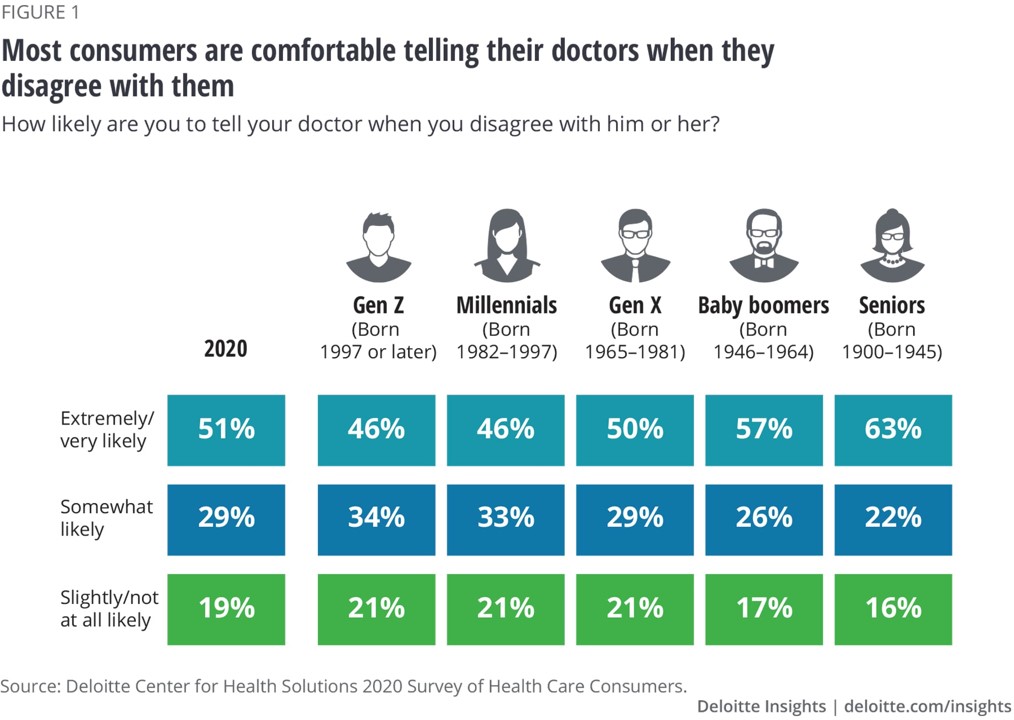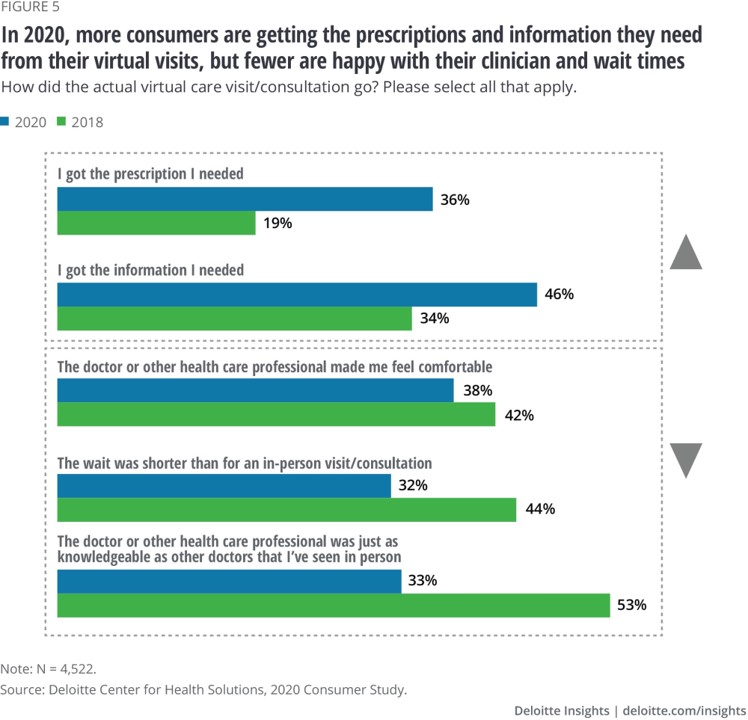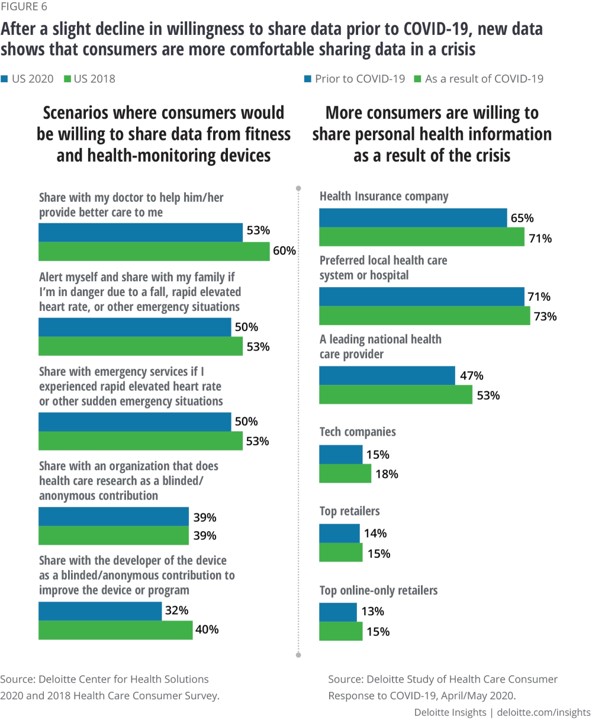The pandemic has become a sort of forcing function on all aspects of daily living, include health care. Deloitte’s latest wave of health care consumer market research updates the COVID-19 impacts on the U.S. health care landscape and asks the question in the study report’s title: “Are consumers already living the future of health?”
For the general survey of U.S. Health Consumers, Deloitte polled 4,522 U.S. adults 18 and older online in February and March 2020. Deloitte conducted an additional 1,510 interviews with consumers in April to gauge peoples’ perspectives on the pandemic, health and well-being.
 In the Great Lockdown phase during the pandemic, consumers were forced to stay and work from home when possible, quarantining to prevent the spread of the infection.
In the Great Lockdown phase during the pandemic, consumers were forced to stay and work from home when possible, quarantining to prevent the spread of the infection.
In the era of COVID-19, the home became the hub of everything — working, schooling, cooking, socializing via virtual platforms, shopping, and DIY’ing what could be done for oneself. Among the DIY workflows was self-care for health care.
Figure 1 from the study tells an interesting story about consumers in the pandemic and their growing sense of agency and engagement: Deloitte found that one-half of people were extremely or very likely to tell doctors they disagree with them, and another 29% said they’d be somewhat likely to speak up to their doctors. That’s 80% of consumers saying they would be likely to disagree with physicians, a vast majority of folks showing self-determination in their health care flows across all generations, from Gen Z to Seniors — the most likely to speak up to their doctors.
 Another area of agency Deloitte measured was use of health and fitness technology and whether consumers felt using the tech changed their behaviors. Nearly twice as many Gen Z and Millennial consumers felt tracking technologies supported their health behavior changes “a great deal” compared with Seniors. Still, one-third of Seniors still felt tracking devices helped behavior change “a little.”
Another area of agency Deloitte measured was use of health and fitness technology and whether consumers felt using the tech changed their behaviors. Nearly twice as many Gen Z and Millennial consumers felt tracking technologies supported their health behavior changes “a great deal” compared with Seniors. Still, one-third of Seniors still felt tracking devices helped behavior change “a little.”
Self-care in the pandemic drove virtual health care visits up across generations due to elective procedures and primary care shifting to telehealth platforms, and some consumers’ concerns about heading back to brick-and-mortar health care settings for in-person high-touch care.
In 2020, nearly one-half of consumers got the health care information they needed online compared with 34% in 2018: and, 36% received a prescription virtually compared with one-half that number in 2018.
Those were process measures that moved in a positive direction.
But consumers’ perceptions of those virtual care experiences did not uniformly satisfy patients only one-third of people felt their clinician was “just as knowledgeable as other doctors I’ve seen in person), and 44% were dissatisfied by the wait for care.
Roughly 3 in 5 consumers thought the clinician made them feel comfortable both in 2018 and 2020.
Deloitte concludes that consumers still want the benefits of in-person health care services — personalized relationships with clinicians. In the pandemic-timed market research, 2 in 3 patients believed a doctor or nurse needed to physically examine them to understand their health care needs, and 56% didn’t think they got the same quality of care or value from a virtual visit compared with an in-person one.
What would improve the consumer health care experience? The top three factors would be empathy and listening — that the health care provider listens to me and shows they care; that the clinician spends time with me and doesn’t rush through an encounter; and, good communication — that the clinician clearly explains what they are doing during the exam and how to follow up after the visit.
 Health Populi’s Hot Points: The pandemic revealed rough spots and “warts” in the U.S. health care system, one of which has been access to data and lack of its interoperability.
Health Populi’s Hot Points: The pandemic revealed rough spots and “warts” in the U.S. health care system, one of which has been access to data and lack of its interoperability.
The third chart illustrates that after a decline in consumers’ willingness to share personal data before the pandemic, more people are comfortable sharing data in a crisis scenario.
Sharing data in a public health crisis is important for both identifying people who have been infected to stop-the-spread of the virus, as well as sharing personal health information for developing treatments to cure disease.
For consumers to share the intimate asset of their personal health data, the situation requires trust. The right side of the graph details consumers’ willingness to share data as a result of the crisis before and after the advent of COVID-19. In each case, the green bar shows that consumers were more willing to share data as a result of the coronavirus public health scenario, with a preferred local health system/hospital or health insurance company ranking at the top of peoples’ share-list (about 7 in 10 people willing to share with each entity), or a leading national health care provider ranking next (among about one-half of consumers).
Many fewer people would be willing to share their health information with a tech company or retailer. This is consistent with recent survey data demonstrating U.S. consumers’ concerns about sharing data for a contact tracing app in development between Apple and Google.
With patients’ growing sense of health agency as consumers, people are taking on more assertive roles in self-care and DIY health care — both for clinical work-flows and for information management and control.
Among Deloitte’s recommendations concluding the report are exploring ways to benefit consumers through data interoperability, investing in virtual health technology and training clinicians in its use, creating more access points for health, and to earn consumer trust through empathy and reliability. All of these tactics would work toward building a more consumer-centered health ecosystem with privacy, security and trust baked into the design. In the post-pandemic U.S. health care environment, this will be table stakes for building health care back better, to borrow a phrase from President Candidate Joe Biden.
